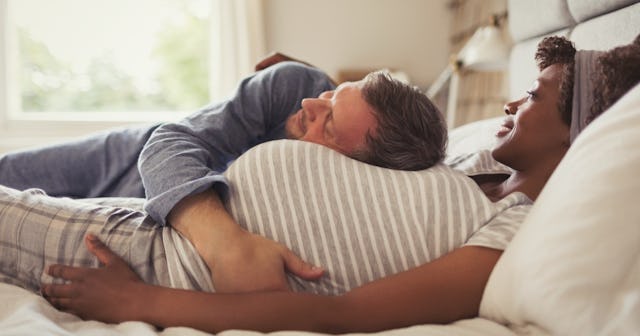Now That You're Pregnant, Here's When You'll Feel The Baby Tap Dance Inside You

Feeling your baby move is one of the most magical, and let’s be real — weirdest — things you experience as a pregnant lady. So what can you expect to feel when your little one starts to kick? Does it hurt? Does it tickle? Will you even notice it? Also, when exactly will your baby start to move? Does it start to happen right away? These are all valid questions, which is why we sought out to answer your most curious questions about your baby’s movements.
When will I feel my baby move?
You should feel the quickening, or your baby’s first movements, pretty early on in your pregnancy. “We can see them moving by ultrasound even around 10 weeks, however, women don’t typically feel the movements until closer to 20 weeks,” Dr. Nicole Smith, MD, MPH, tells Scary Mommy.
If it’s your first pregnancy, then you probably won’t feel the kicking of little feet until the 25th week, according to WebMD.
But, of course, as Smith points out, every mother and baby are different. “Some women report feeling some movements even around 15 weeks, while others don’t feel movements until 20 or 21 weeks. The position of the uterus, and the position of the placenta in the uterus, can impact how early movements are felt.”
You’re also more likely to feel your baby’s movement when you’re relaxing, either quietly lying or sitting down.
It’s my second pregnancy. Will I feel my baby move earlier or later?
WebMD reports that most women feel a baby’s movement as early as 13 weeks during a second pregnancy. According to Smith, some women notice the movements earlier in the second pregnancy. “It may be that the second time around they know what to look for,” she says.
I’m having twins. Will the movement feel differently?
“Twins may feel different later on, but early in the pregnancy the same expectations around timing and strength of movement apply,” says Smith.
According to What to Expect, while some twin mothers might be able to tell the separate movements of each twin, mainly because one twin might hang out on the right side of the uterus, while the other is chilling on the left side, over time, because the babies are positioned so close together and taking up a lot of space in one little womb, chances are you won’t be able to tell which twin is kicking you the hardest.
What does a baby’s movement actually feel like?
Is it gas or did your baby just roundhouse you? Sometimes it’s hard to tell.
“Early on, movements can feel like a little gas bubble or fluttering in the lower middle part of moms’ bellies,” says Smith. “Later on, those movements feel stronger, either like kicks, or tightening.”
What’s abnormal movement?
As for what might be an “abnormal” movement, Smith says there’s basically no such thing. “Babies jerk and make unusual movements after birth, and they make the same movements inside.” She adds that most doctors “generally think that any movement is good, and there is no such thing as ‘too much movement.’”
Things get sticky when you don’t feel any movement, which is why WebMD recommends keeping tracks of your little one’s kicks to ensure your baby is developing normally.
How to count baby kicks?
So how do you count your baby’s little dance moves? According to the American Pregnancy Association, the American Congress of Obstetricians and Gynecologists (ACOG) recommends that you time how long it takes you to feel 10 kicks, flutters, swishes, or rolls. Ideally, you want to feel at least 10 movements within two hours (although you’ll probably feel them within less time).
To help record your mini gymnast’s moves, it’s suggested to keep a notebook close by (your phone works too) and record when your feel your first movement of the day, and then keep making little checkmarks until you feel 10 movements. Note the time. From there you’ll be able to recognize patterns. The idea behind this? To be on the lookout for deviations in patterns of your baby’s movement. For example, the American Pregnancy Association suggests if you haven’t felt 10 kicks by the end of the second hour, wait a few hours and try again. If after trying a second time, and you don’t feel 10 movements within two hours, it’s recommended to contact your doctor or local health care provider.
But try to relax because movement isn’t a clear indicator of your baby’s health. Which is why if you have any concerns then you should contact your OB to address any questions you might have.
Written by Brianne Hogan.
Read More:
Pregnancy Will Have You Peeing All The Time And Feeling Like A Waterfall
How To Safely Deal With Headaches During Pregnancy
Real Talk: Pregnancy Hemorrhoids Will Strip You Of Any Dignity You Had Left
This article was originally published on